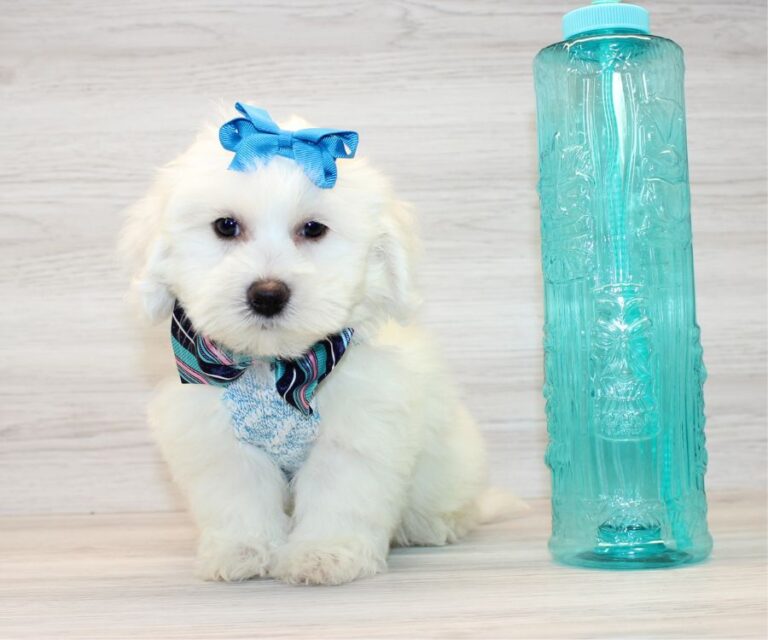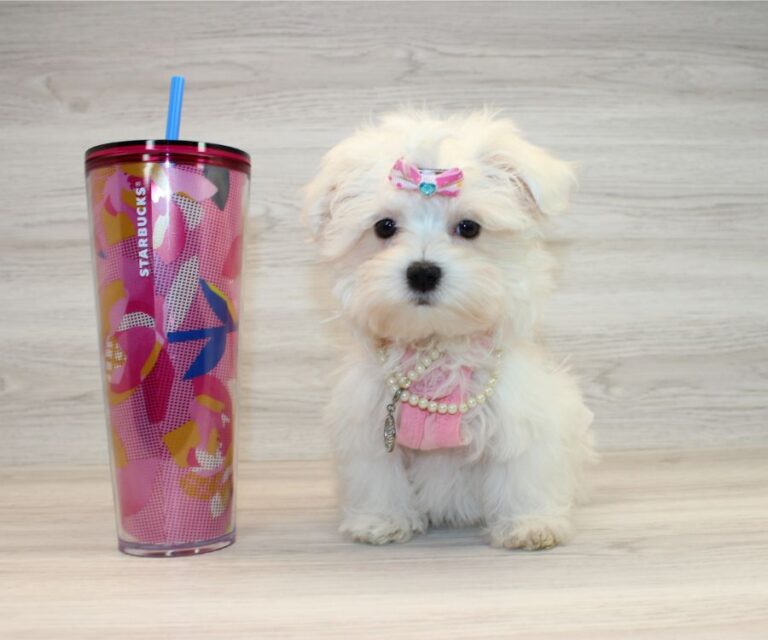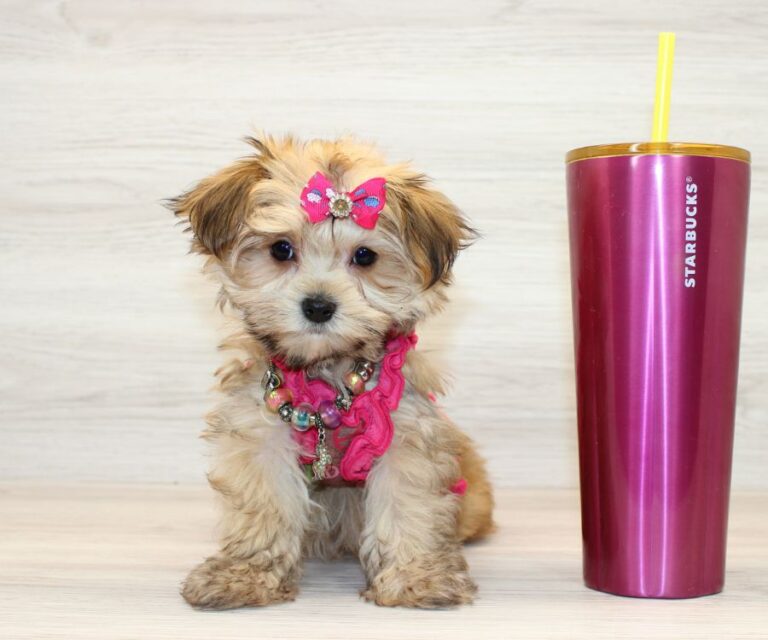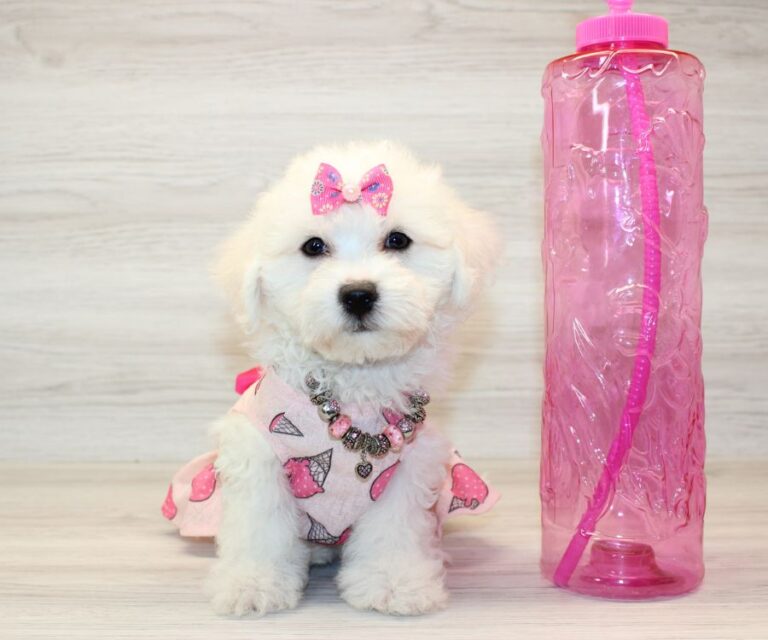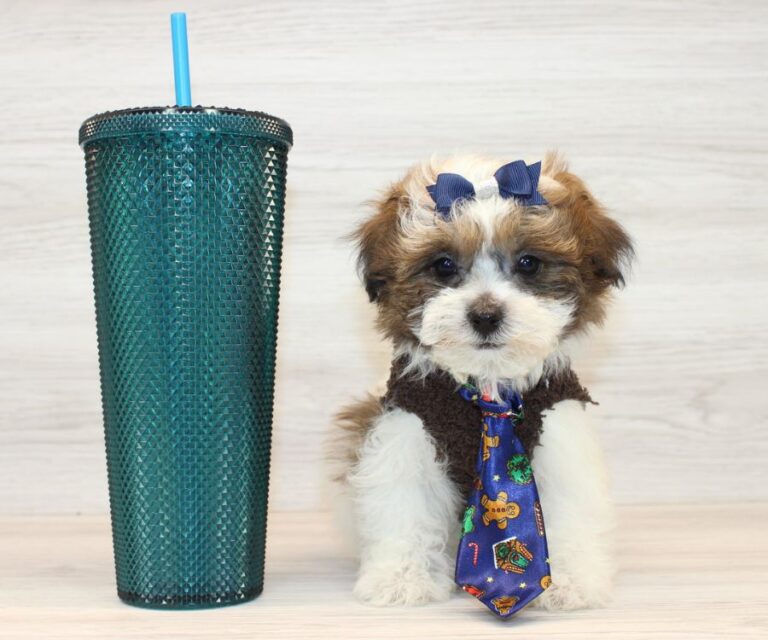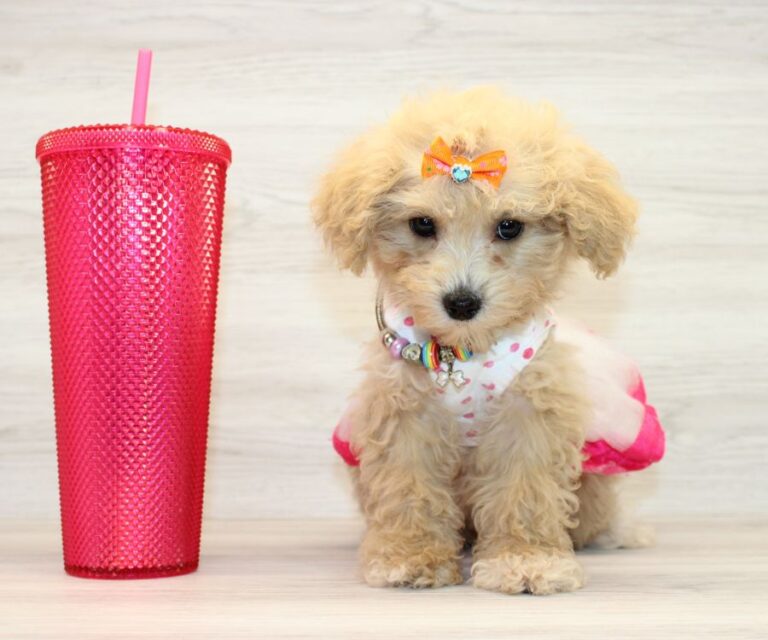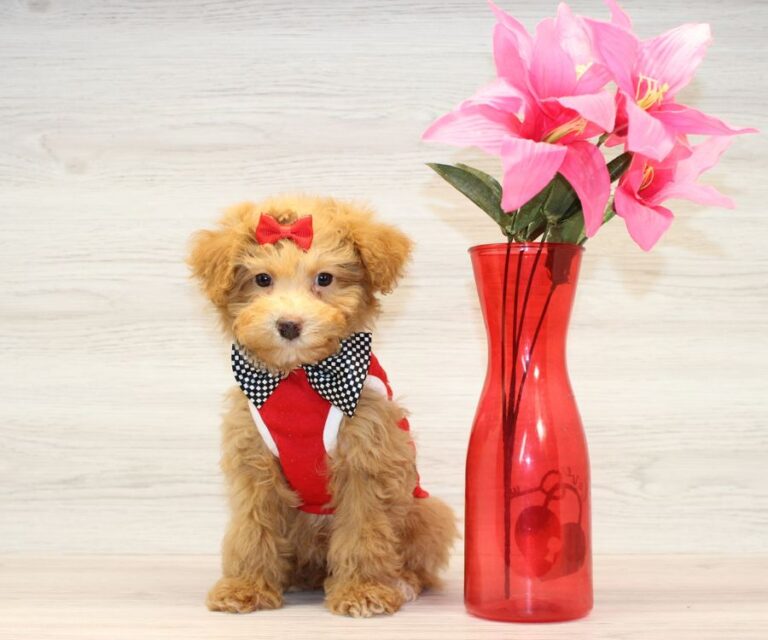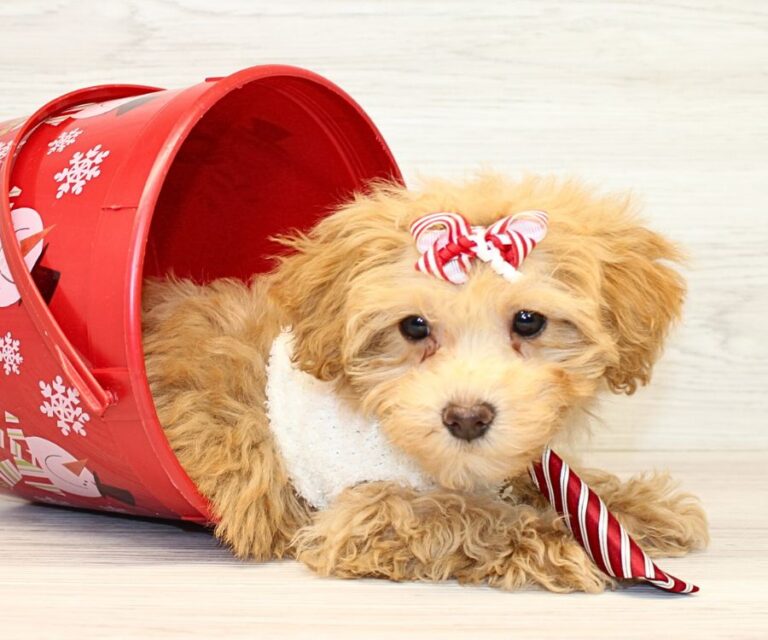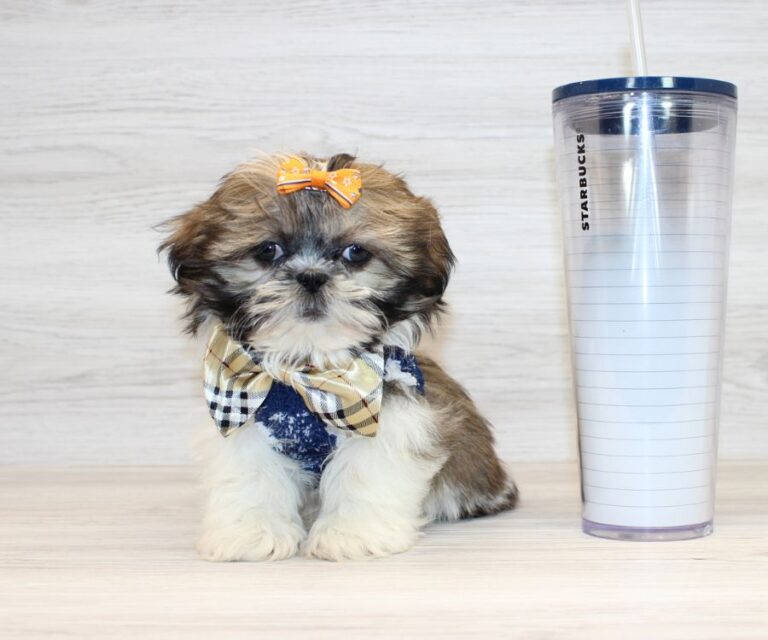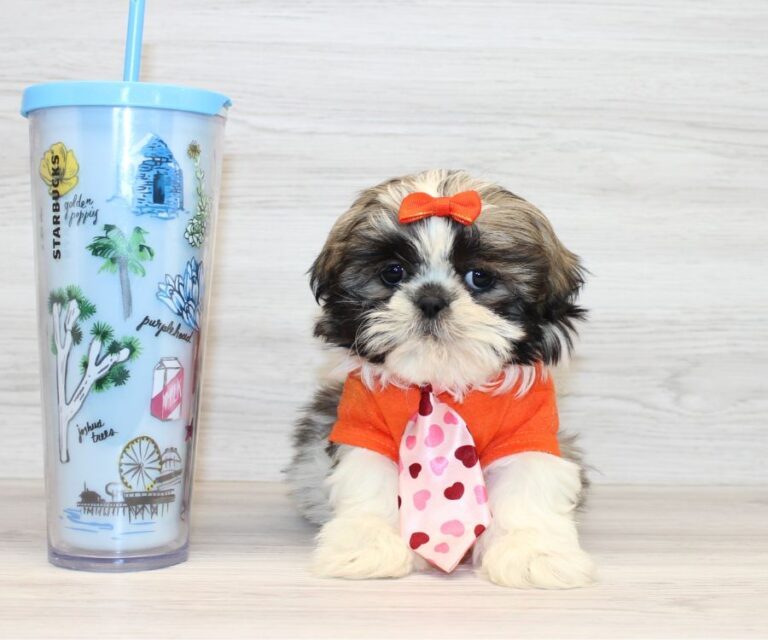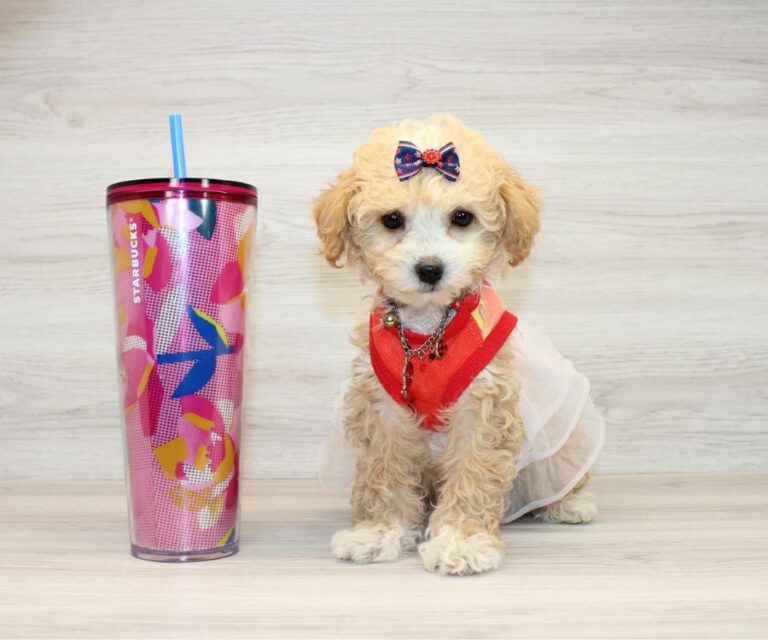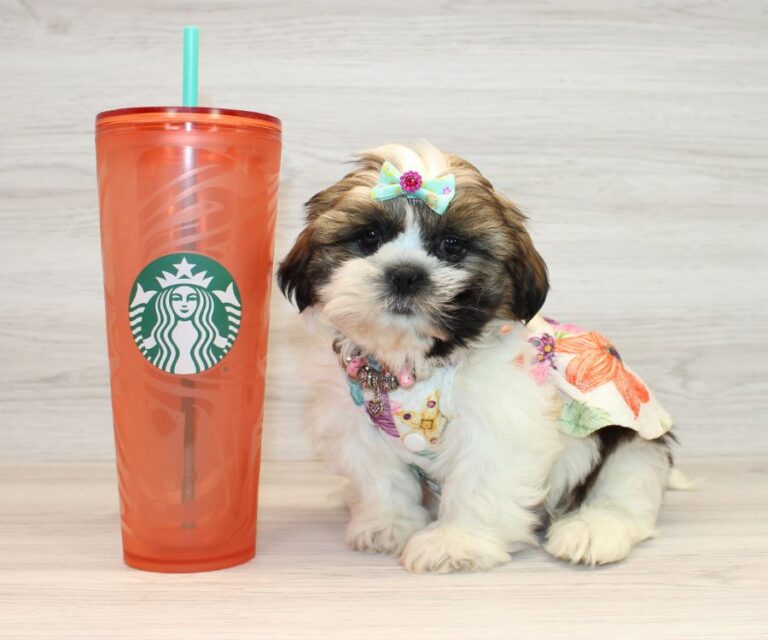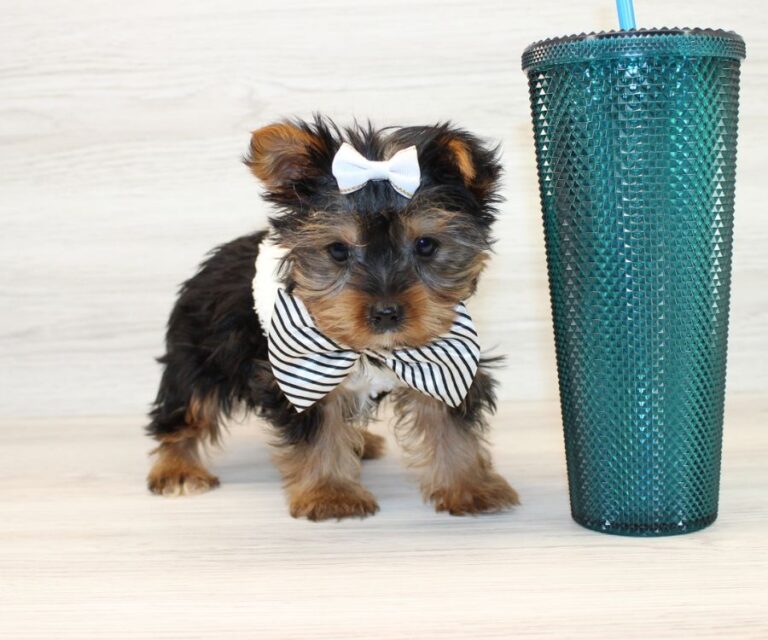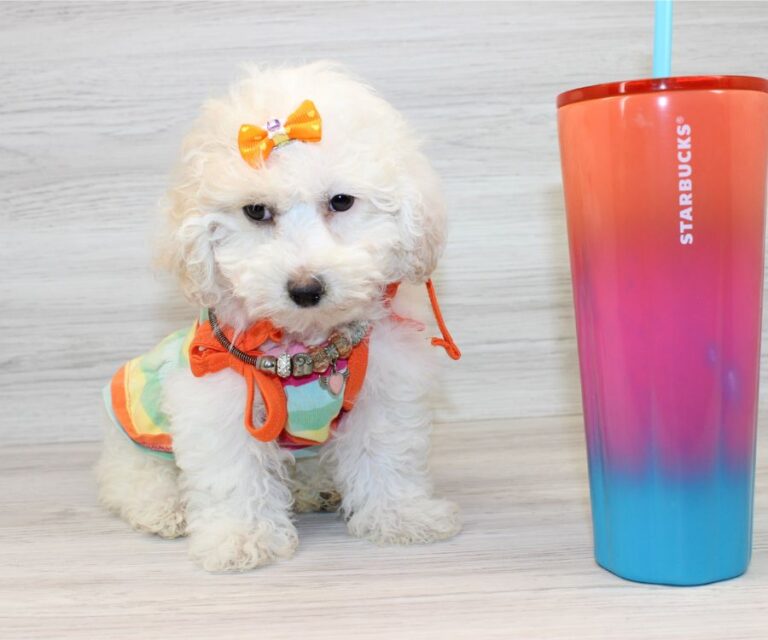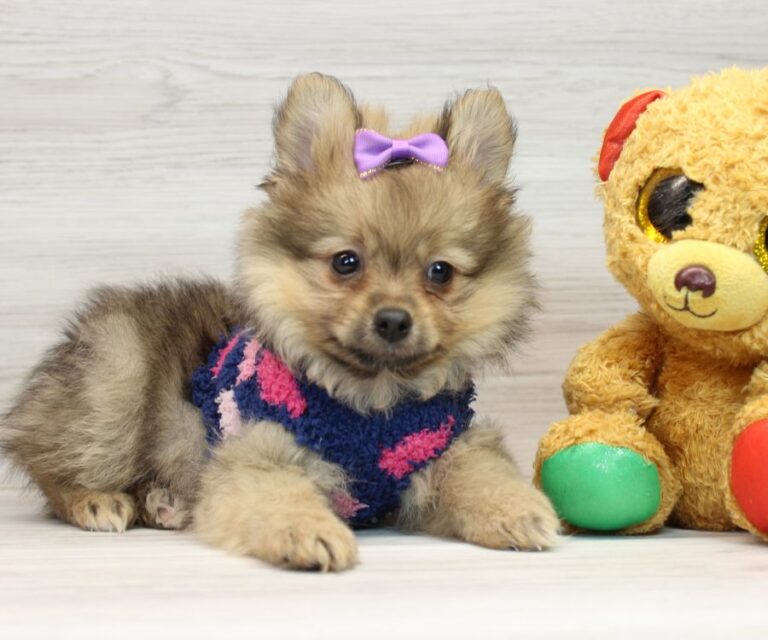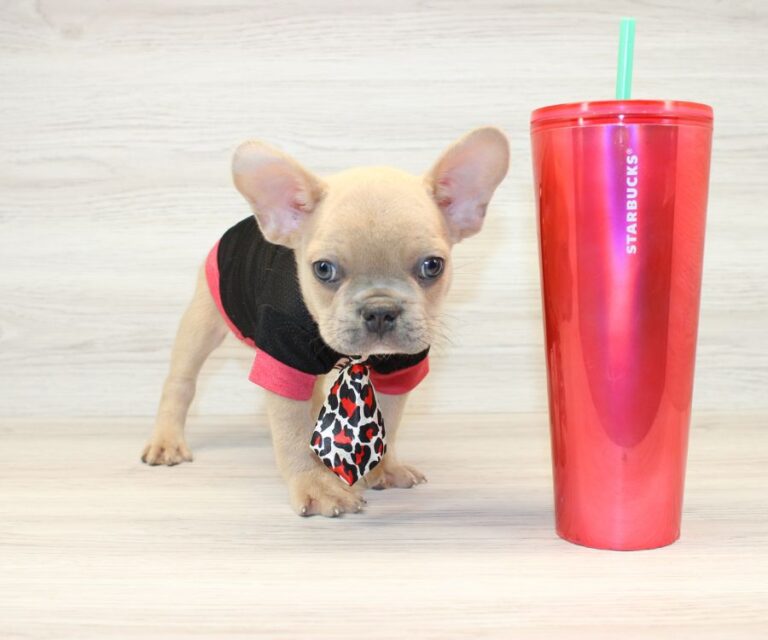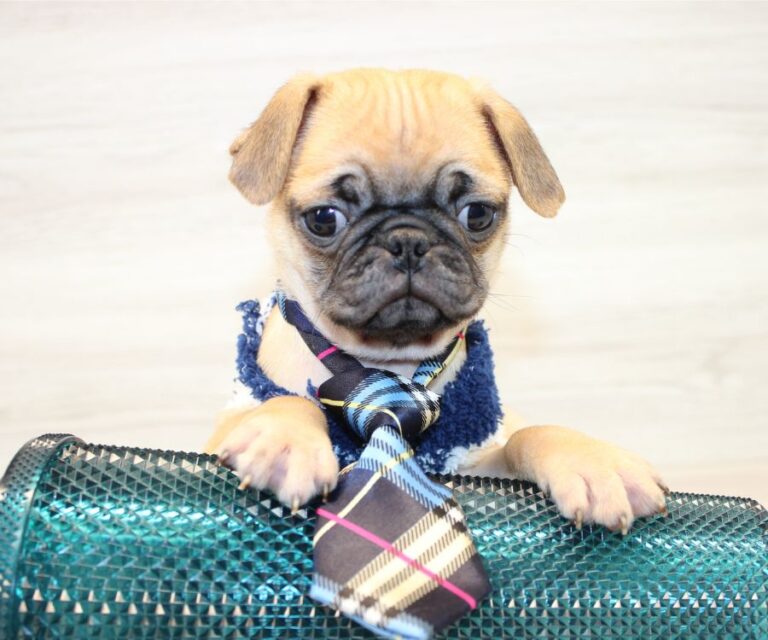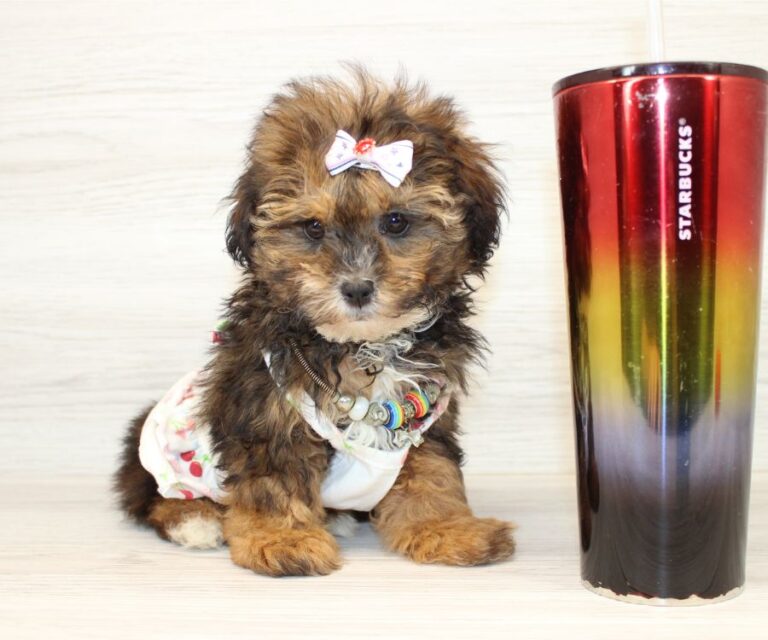At PuppyHeaven.com, you’ll find an exclusive range of toy and teacup puppies available for sale in Chula Vista, CA. These puppies are perfectly suited for smaller living spaces due to their compact size, typically ranging from 2 to 5 pounds. Popular breeds include the energetic Teacup Pomeranian, the bold Teacup Yorkie, and the loyal Teacup Chihuahua. Each puppy comes with a health guarantee, and the necessary vaccinations are meticulously documented. With their manageable exercise needs and adaptability, these puppies make ideal companions for apartment dwellers. By exploring further, you’ll uncover extensive tips on care, training, and socialization tailored to these tiny breeds.
Why Choose Toy & Teacup Puppies
Choosing toy and teacup puppies offers numerous advantages, including their manageable size, adaptability to smaller living spaces, and typically lower exercise requirements. These qualities make them ideal for residents of apartments or homes with limited space. As you consider the space requirements, you’ll find that these smaller breeds can thrive in less expansive environments, requiring minimal space for their comfort and activity.
From a price consideration standpoint, while the initial purchase price of toy and teacup puppies might be higher due to their desirability and breeding considerations, the long-term costs can be more manageable compared to larger breeds. These smaller dogs consume less food, require smaller doses of medications, and often incur lower costs for supplies such as beds and toys. Additionally, grooming and maintenance expenses can be less burdensome, as their smaller size makes tasks like bathing and nail trimming easier to manage at home.
When serving individuals who seek companionship without the robust demands of larger pets, these petite puppies represent a thoughtful recommendation. They not only meet the physical constraints of smaller living arrangements but also align well with budget considerations, all while providing the joy and companionship desired from pet ownership.
Health Benefits of Small Dogs
Beyond their manageable size and lower costs, small dogs like toy and teacup puppies also offer significant health benefits to their owners. To begin with, the exercise needs of smaller breeds are typically lower than those of larger dogs. This makes them ideal companions for individuals who may find it challenging to meet the demanding exercise requirements of larger breeds. Their compact size allows for indoor play and short walks that are sufficient to keep them healthy and content, facilitating a more manageable routine for you.
Secondly, owning a small dog can contribute to lifespan extension. Studies have shown that the companionship of a pet, particularly a dog, can decrease stress levels, lower blood pressure, and increase physical activity, all of which contribute to a longer and healthier life.
Here are the three major health benefits small dogs like toy and teacup puppies offer:
Reduced Cardiovascular Stress: Their presence can soothe the heart and lower blood pressure.
Enhanced Emotional Well-being: Regular interaction with these dogs boosts mood and decreases feelings of loneliness.
Increased Physical Activity: Meeting their exercise needs often involves light to moderate physical activity, which promotes overall health.
In essence, the companionship of a small dog brings measurable health advantages, serving both physical and emotional needs.
Popular Breeds at Puppyheaven
At Puppyheaven in Chula Vista, CA, you’ll find an array of toy and teacup breeds, each with unique characteristics and care requirements.
Among the top toy breeds, you’ll encounter options such as the playful Pomeranian and the affectionate Shih Tzu, while favorite teacup varieties often include the tiny Chihuahua and the graceful Yorkie.
Understanding the specific care tips for these small breeds is crucial to guarantee their health and happiness.
Top Toy Breeds
Why not consider some of the top toy breeds available at Puppyheaven, renowned for their charm and compact size? When exploring breed popularity and size comparison, these breeds stand out:
Chihuahua: Known for their alertness and devotion, Chihuahuas are one of the smallest dog breeds, making them ideal for compact living spaces.
Pomeranian: Famous for their fluffy coats and energetic demeanor, Pomeranians are slightly larger than Chihuahuas but remain within the toy size category.
Yorkshire Terrier: These dogs offer a perfect blend of elegance and feistiness, fitting comfortably into the toy breed classification.
Each breed presents unique characteristics, catering to different preferences and lifestyles, ensuring you find the perfect companion to serve your needs and enrich your life.
Favorite Teacup Varieties
Among the most sought-after teacup varieties at Puppyheaven, the Teacup Pomeranian, Teacup Yorkie, and Teacup Chihuahua consistently capture the hearts of prospective pet owners with their diminutive stature and vibrant personalities. In size comparison, these breeds generally weigh between 2 to 5 pounds, making them ideal for smaller living spaces.
Originating from larger counterparts, each breed carries distinct traits and histories. The Teacup Pomeranian, derived from the larger Spitz-type dogs of the Arctic regions, is known for its luxurious fur and spirited demeanor. The Teacup Yorkie, with roots in England’s working class, exhibits a bold and adventurous spirit. Meanwhile, the Teacup Chihuahua, hailing from Mexico, offers a sassy and loyal companionship that belies its small size.
Care Tips Essentials
To ensure your teacup puppy remains healthy and happy, it’s important to follow specific care guidelines tailored to their unique needs. Here are key aspects to keep in mind:
Feeding Schedules: Establish regular feeding times with portions suitable for their small size. Nutrient-dense, high-quality food is essential for their delicate digestive systems.
Grooming Tools: Invest in appropriate grooming tools. Soft brushes and combs specifically designed for teacup breeds can prevent skin irritations and maintain coat health.
Veterinary Care: Regular check-ups are crucial. Due to their diminutive stature, teacup puppies can develop health issues that require prompt attention.
Puppy Care Essentials
Ensuring your toy or teacup puppy’s health starts with understanding the essentials of proper care, including diet, exercise, and regular veterinary visits. Puppy nutrition is paramount. You’ll need to provide a balanced diet rich in proteins, fats, and carbohydrates, specifically formulated for small breed puppies. These nutrients support their rapid growth rates and high energy levels, while also ensuring proper development of bones and teeth.
Exercise routines should be tailored to their diminutive size and energy levels. Short, frequent walks and gentle play sessions are advisable, as excessive exercise can lead to joint issues later in life. Always monitor your puppy during activities to prevent overexertion.
Regular check-ups with a veterinarian are essential. They help in monitoring your puppy’s health, ensuring vaccinations are up to date, and detecting any early signs of illness. Dental care, too, is vital; start dental hygiene early to prevent future gum and teeth problems.
Moreover, create a safe, nurturing environment for your puppy. This includes having a quiet space for rest, and access to fresh water and clean bedding. Remember, your commitment to their health and well-being will pave the way for a joyful and healthy life together.
Training Tips for Tiny Breeds
Training your toy or teacup puppy requires a gentle approach and consistent techniques tailored to their small size and sensitive nature. To effectively manage potty challenges and implement necessary behavioral modifications, consider these focused strategies:
Frequent, Scheduled Potty Breaks: Due to their tiny bladders, toy and teacup breeds need to relieve themselves more often. Establish a strict routine with potty breaks every 1-2 hours, especially after meals, naps, and play sessions. This regularity helps minimize accidents and reinforces where it’s appropriate to go.
Positive Reinforcement: Use treats, praise, or gentle petting to reward your puppy when they display desirable behaviors. This positive reinforcement encourages repetition of the correct actions without causing fear or distress that can occur with harsher methods.
Short, Engaging Training Sessions: Keep training sessions brief (5-10 minutes) to maintain your puppy’s attention. Their small size and young age can lead to quick fatigue and decreased focus, making shorter, more frequent sessions more effective for learning.
Socializing Your New Puppy
Once you’ve brought your new puppy home, it’s important to start socializing them early with various people, pets, and environments to build their confidence and adaptability. This foundational phase is pivotal in preventing future behavioral issues and ensuring a well-rounded development.
Initiate this process by introducing your puppy to a wide spectrum of friendly individuals and calm pets. It’s vital to monitor these interactions closely to make sure they remain positive experiences for your puppy, reinforcing good behavior at each step. Remember, the goal is to foster a sense of safety and enjoyment in these early encounters.
Puppy playdates can be an excellent way for your puppy to learn appropriate social cues from other dogs. These should be arranged with known, vaccinated pets in safe, controlled settings. Additionally, enrolling in behavioral classes offers a structured environment where your puppy can further develop their social skills. These classes are typically led by certified trainers who provide essential guidance on social interaction among puppies, which is important for their behavioral education.
Understanding Puppy Vaccinations
As you consider the health of your new toy or teacup puppy, it’s vital to understand the vaccine schedule essentials. You’ll need to know which shots are required and why they’re important for your puppy’s long-term health.
Additionally, following vaccine safety tips can prevent potential adverse reactions and guarantee a healthy start for your pet.
Vaccine Schedule Essentials
Every new puppy owner must grasp the critical significance of following a proper vaccination schedule to guarantee their pet’s health and safety. It’s crucial to maintain ideal vaccine storage conditions, as improper storage can deactivate vaccines, rendering them ineffective. Immunization record keeping is equally crucial; it ensures that your puppy receives timely shots and maintains an adequate immune response.
Here are key points to remember:
Vaccine Storage Conditions: Vaccines should be stored at recommended temperatures to preserve their efficacy.
Immunization Record Keeping: Maintain a detailed log of each vaccination, including dates and vaccine types.
Regular Vet Visits: Schedule regular check-ups to adapt the vaccination plan as your puppy grows and its health needs evolve.
Adhering closely to these guidelines will foster a healthy start for your puppy.
Required Shots Explained
Understanding the specific vaccines your puppy needs, let’s examine the essential shots required for best health and protection against common diseases. Core vaccinations, important for immunity development, include parvovirus, distemper, and rabies. These vaccines are essential as they cover highly contagious and potentially fatal illnesses. Non-core vaccinations, tailored to your puppy’s environment and lifestyle, might also be recommended by your vet.
Vaccination costs vary depending on geographic location and the specific shots administered but view these expenses as an investment in your puppy’s long-term health. Starting vaccinations around six to eight weeks of age and following the booster schedule ensures a robust immune system, safeguarding your puppy from common pathogens they might encounter.
Vaccine Safety Tips
To guarantee your puppy’s health and safety, it’s vital to follow recommended guidelines when administering vaccines. Proper vaccine administration is key in preventing adverse reactions and ensuring the injection sites heal properly.
Here are key considerations for vaccine safety:
Monitor Injection Sites: Regularly check sites for signs of redness, swelling, or discharge which might indicate an infection or allergic reaction.
Observe for Adverse Reactions: After vaccination, watch your puppy for any unusual symptoms such as lethargy, hives, or respiratory distress. Immediate veterinary attention is required if any of these occur.
Schedule Follow-Up Visits: Ensure follow-up visits are adhered to for monitoring and additional doses as required to maintain vaccine efficacy and minimize risks.
Preparing Your Home
How can you effectively prepare your home for the arrival of a toy or teacup puppy?
First, consider space planning; these small breeds require a safe, contained environment to prevent injuries and escape. Designate a specific area in your home where your puppy can sleep, eat, and play. Make certain this area is free of small objects that could be swallowed and away from heavy foot traffic to reduce stress.
Next, address allergy precautions. Even though toy and teacup puppies are small, they can still trigger allergies. Prior to bringing your puppy home, it’s wise to invest in an air purifier to minimize dander. Regularly clean surfaces, fabrics, and your puppy’s play area to keep allergens at bay. Consider hypoallergenic bedding for your puppy’s crate to further diminish potential reactions.
Additionally, secure all electrical cords and toxic plants out of reach, and make sure all low windows are closed or securely screened. Puppies are curious and can easily get into dangerous situations without proper precautions.
Adoption Process Overview
Once your home is ready for your new puppy, you’ll need to acquaint yourself with the adoption process to guarantee a smooth acquisition of your toy or teacup puppy. Understanding the steps involved, including legal considerations and adoption fees, is essential for a successful shift.
Application Submission: You’ll start by completing a detailed application. This form assesses your suitability as a pet owner and ensures that the puppy you’re interested in is a good match for your living environment and lifestyle.
Review of Legal Considerations: It’s important to understand the legal framework surrounding pet adoption. This includes acknowledging ownership responsibilities, vaccination requirements, and compliance with local pet ownership laws. You should thoroughly review all adoption agreements and health guarantees.
Payment of Adoption Fees: Adoption fees cover the initial veterinary care, vaccinations, microchipping, and spay/neuter procedures. These fees ensure that your puppy is healthy and ready to start life in its new home without immediate additional medical expenses.
Conclusion
You’re now equipped to bring a toy or teacup puppy into your life. Remember, these small breeds require specific care, from tailored training to thorough socialization.
Make sure your home is prepared to welcome them, and understand the crucial vaccination schedule to keep them healthy.
By following these guidelines and completing the adoption process at Puppyheaven, you’ll guarantee your new furry friend adjusts well and thrives in their new environment.
Welcome to the rewarding journey of puppy parenthood!

